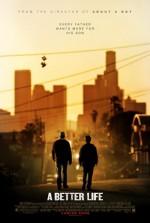A Better Life

Years ago, Carlos Galindo (Demián Bichir) crossed the border from Mexico to America. Since then he’s bounced from job to job, had a son (José Julián), and gotten a divorce, which is to say he’s lived the American dream. When a colleague offers him his truck and the lawn business which goes with it, he finally has the keys to “a better life” in his hands for himself and his son, and he’ll do what he has to to hold onto it.
Borrowing hefty amounts from Vittoria De Sica’s Bicycle Thieves, Chris Weitz‘s (The Twilight Saga: New Moon, About a Boy) look at life among Latino immigrants in Los Angeles is by turns affecting, melodramatic, clichéd, and realistic, held together by a quiet lead performance by Bichir (“Che”).
Instead of a bicycle, we get a truck — a gardener’s truck Galindo hopes to use to get his new business off the ground and get his son out of the school/prison he spends his days in, being prepared for little besides eventually joining a street gang. When the truck is stolen, father and son must put aside their differences and hit the streets, trying to find some clue to the truck’s whereabouts and with it regain their hopes for the future.
In his attempt at portraying the illegal immigrant experience, Weitz has put together one of his tightest narratives, from a screenplay by Eric Eason and Roger Simon, but one based for better or worse on an ideal.
See, Galindo is just an all-around good guy. He keeps his word, goes to work every day, tries to keep his son in school, and generally hopes for the best despite all the adversity he’s gone through and what little materially he has to show for it. A Better Life truly is at its best when focused solely on him, as Bichir’s haggard face and quiet delivery keep Galindo from becoming a saint, demonstrating that he is just a man. Really, he may be too good — this is supposed to be a drama about a simple man trying to make his way in the world, but he’s not really a simple man. He has no vices, partly because he can’t afford them, and an infinite amount of forgiveness, because he’s seen the dark side of the world. It’s a welcome piece of humanity in a film that could be horribly preachy, but it’s also almost overdone.
Carlos is counter-pointed in almost every respect by his son Luis. Hot-headed, arrogant, and rude, Luis has no respect for what his father has done for him and little ambition to do better, preferring to just relax with his friends. While he is about to get his eyes opened to real suffering, as he and his father delve deep into Los Angeles to find the man who stole their truck, Julián doesn’t really have the chops to keep up with Bichir. His dialogue frequently comes across like he’s reading it, and he’s done no favors by a script which often gives him its worst lines.
If it were just his movie, that would be a larger problem than it is. But it’s not, and that counts for a lot. Bichir’s performance is able to hold some of the weaker elements together, and for whatever flaws the films dialog and characterization may have, its plot is so inexorable you can’t help but be drawn in.
Weitz has put together one of his most understated pieces of drama, with naturally-saturated sequences from cinematographer Javier Aguirresarobe and sharp editing by Peter Lambert. While large portions of it are undoubtedly more about showing off the realities of immigrant life in Los Angeles than creating a look at Carlos’ and his family’s everyday world, A Better Life works more often than not. Weitz is obviously trying hard to keep his hands off the scale.
Some uneven supporting performances and a script which leans on cliché as much as it does humanity hamper a genuinely moving piece of human drama, but A Better Life showcases real Weitz’s filmmaking skill, which has been all but hidden until now. More importantly, it showcases a fine performance from Bichir that proves neither sentimentality nor quirkiness is needed to maintain an audience’s interest when you’ve got real drama on your hands.
Cast: Demián Bichir as Carlos Galindo; José Julián as Luis Galindo; Joaquín Gosio as Blasco Martinez; Eddie “Piolin” Sotelo as Himself; Gabriel Chavarria as Ramon; Chelsea Rendon as Ruthie Valdez; Isabella Rae Thomas as Linda; Carlos Linares as Santiago.



Leave a Reply